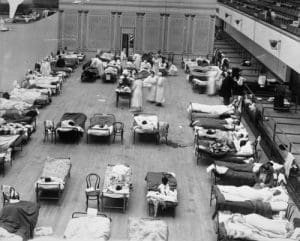Over 100 years ago, Oaklanders faced another worldwide health crisis.
This week we all became players in a global drama brought on by the COVID-19 coronavirus. How we respond in the coming weeks will help determine our survival rates. But, as unique as this experience seems, it’s really just another case of history repeating.
A little more than a century ago, the world was gripped by another pandemic which left our country and the city of Oakland in fear. It was called the Spanish influenza epidemic. This was before the time of antibiotics and respirators and healthcare plans. The flu spread quickly and reached pandemic proportions due, in large part, to the global conflict of World War I. Though Americans only joined the war in 1917, three years after it began, they were among the virus’ major carriers.
The first cases of the flu were reported in January 1918 to health authorities—not in Spain as the name of the disease would suggest—but in the state of Kansas. Citizens in Haskell County, Kansas, started coming down with a virulent strain of pneumonia. Soldiers stationed in Camp Funston (now Camp Riley) in central Kansas were coming down with the virus when the mobilizations to other army camps throughout the country began. Eventually, as the European conflict raged on, Americans came to the aid of its allies in Western Europe. The mobilization of US soldiers to France began in early Spring 1918.
Meanwhile the flu continued to spread on the home front. Oakland health officials imposed strict measures to try to keep the disease from spreading. Posters mounted around town by the health department advised nurses, workers, and “householders” how to care for the sick. People were instructed to wash their hands regularly, to cover their coughs, to avoid sharing towels, to get plenty of sleep and a dose of daily sunshine, and to eat healthy foods. By late October 1918, there were 3,500 cases reported in the city. Mayor John L. Davie issued a citywide closure of all theatres, movie houses, schools, churches, and public arcades. Prisoners were commissioned to dig graves and work as orderlies in emergency wards. Fines of $5-$100 were levied on those caught outside without their face masks. Three hundred men and women were deputized to secure the names and addresses of those caught not wearing their masks.
Women answered the call for volunteers to tend to the ill, making and distributing face masks for the Red Cross, and educating the public on how to prevent the spread of the disease. The Oakland Municipal Auditorium was transformed into a makeshift hospital to accommodate the large number of patients local hospitals could not take in.
The influenza pandemic lasted fifteen months, with fatalities spiking between October and December. Another deadly increase occurred in Spring 1919, due in part to the massive demobilization of troops out of Europe. Scholars estimate that the disease killed 50- to 100-million people worldwide, more people than all the casualties of both world wars combined. The flu killed 670,000 Americans and 1,400 Oaklanders. Locally the virus' victims included sea captain William Shorey, known as “the Black Ahab, and University of California philanthropist Phoebe Apperson Hearst.
Historic precedent shows us that we are only at the beginning of this worldwide epidemic. As people did a century ago, following health department guidelines will help prevent the spread of the COVID-19 virus.
- Observe the county-mandated shelter in place order.
- Wash hands frequently with soap and water.
- If you have to go out, avoid places where large numbers of people have gathered (such as bars, restaurants, grocery stores).
- While at home, using disinfectant wipes or solutions, clean off surfaces that are used by several people where germs can be transmitted (such as doorknobs, countertops, cabinet doors, remote controls, and light switches).
Use the Oakland Public Library’s electronic resources, including books, music, films, the New York Times free subscription, and magazines to stay informed and engaged during this challenging time.
Stay safe!




Add a comment to: The Influenza Pandemic of 1918